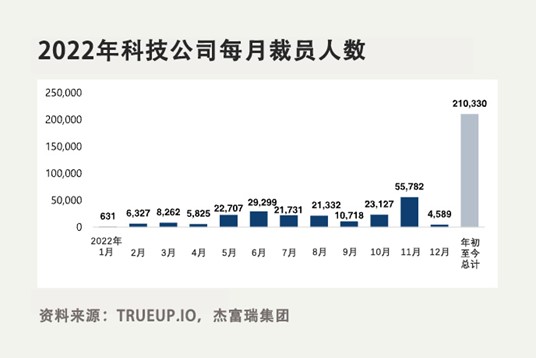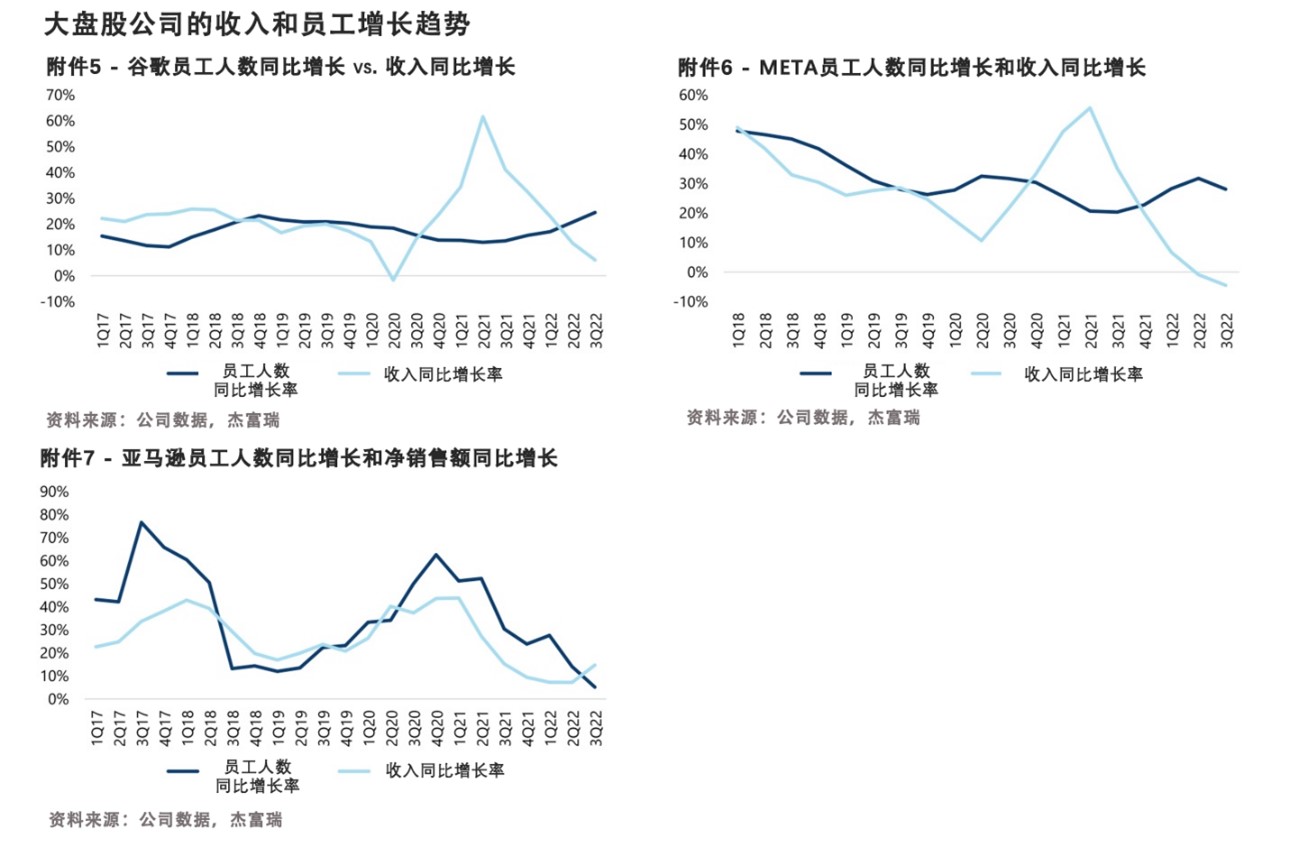
投资银行杰富瑞集团(Jefferies)在周三的一份研究报告中写道,在经济动荡时期,硅谷的裁员潮和暂停招聘都表明大型科技公司“都认识到一种新现实”。
这很可怕,但这种状况到底意味着什么?
该报告的首席分析师布伦特·希尔对《财富》杂志表示:“新现实是需求正在减少。科技公司一直在积极招聘,如果我们真地陷入经济衰退,更多裁员将是不可避免的。”
分析师引用TrueUp的数据称,今年已经有约21万名科技公司员工被裁员,其中高达40%的裁员发生在第四季度。杰富瑞集团的分析师发现,互联网和软件公司目前的招聘岗位平均数量较今年年初时减少了36%。希尔表示,这暴露出科技公司在“低息贷款时期”的“过度扩张”。
在大型科技公司中,Meta宣布计划裁员11,000人,占总员工人数的13%。据媒体报道,亚马逊(Amazon)已经开始类似规模的裁员,但最终会有多少员工被裁,目前仍不得而知。与此同时,微软今年宣布两轮裁员,在10月份最近一次裁员1,000人。
杰富瑞指出,谷歌(Google)是唯一一家尚未宣布裁员的大盘股科技公司,但谷歌在今年早些时候已经暂停招聘。
希尔表示:“你会发现不断有证据证明,无论大型、中型还是小型公司,都处于将已发生的情况合理化的时期。”他还表示:“需求不复存在,他们面临巨大的成本压力。”杰富瑞指出,这三家公司的员工人数与其持续下滑的收入形成鲜明对比,凸显出两者的不匹配,以及这种合理化的必要性。

科技公司裁员源自疫情期间的过度招聘,分析师指出,科技公司需要“结合当前的需求趋势,重新提高团队的工作效率”。
希尔表示:“收入减少导致员工创造的单位收入下降,公司必须放慢招聘速度。”
亚马逊和Meta在今年第三季度的收入都表现不佳,与它们在疫情期间的成功截然相反。
希尔引用巴菲特的“裸泳论”表示:“我认为这种时期能够暴露出哪些公司是‘专业运动员’,哪些是‘业余选手’。”巴菲特认为当市场下行时会暴露出各种问题。希尔表示,未来还会有更多裁员,但他无法确定裁员规模,只是将远高于目前的水平。
他说道:“如果你是科技公司的从业者,要做好准备——未来将异常艰难。你最好让公司看到你的工作效率,因为这是公司所需要的,而且这不会是第一波裁员。”
杰富瑞认为,美国经济将在明年第三季度陷入衰退。因此,希尔表示经济衰退尚未到来,而“众所周知,科技公司一直过于乐观”。
他说道:“我们不想哗众取宠。我们没打算引起别人的关注。我们只是在面对现实,那就是科技公司必须调整其成本结构,因为在经济下滑时期,如果他们无法控制收入,他们只能控制一件事。那就是支出。而在科技行业最大的支出就是人事。”
希尔表示,科技行业的这种“新现实”是经济下滑过程自然而然的一部分,科技公司也无法“幸免”。(财富中文网)
翻译:刘进龙
审校:汪皓
投资银行杰富瑞集团(Jefferies)在周三的一份研究报告中写道,在经济动荡时期,硅谷的裁员潮和暂停招聘都表明大型科技公司“都认识到一种新现实”。
这很可怕,但这种状况到底意味着什么?
该报告的首席分析师布伦特·希尔对《财富》杂志表示:“新现实是需求正在减少。科技公司一直在积极招聘,如果我们真地陷入经济衰退,更多裁员将是不可避免的。”
分析师引用TrueUp的数据称,今年已经有约21万名科技公司员工被裁员,其中高达40%的裁员发生在第四季度。杰富瑞集团的分析师发现,互联网和软件公司目前的招聘岗位平均数量较今年年初时减少了36%。希尔表示,这暴露出科技公司在“低息贷款时期”的“过度扩张”。
在大型科技公司中,Meta宣布计划裁员11,000人,占总员工人数的13%。据媒体报道,亚马逊(Amazon)已经开始类似规模的裁员,但最终会有多少员工被裁,目前仍不得而知。与此同时,微软今年宣布两轮裁员,在10月份最近一次裁员1,000人。
杰富瑞指出,谷歌(Google)是唯一一家尚未宣布裁员的大盘股科技公司,但谷歌在今年早些时候已经暂停招聘。
希尔表示:“你会发现不断有证据证明,无论大型、中型还是小型公司,都处于将已发生的情况合理化的时期。”他还表示:“需求不复存在,他们面临巨大的成本压力。”杰富瑞指出,这三家公司的员工人数与其持续下滑的收入形成鲜明对比,凸显出两者的不匹配,以及这种合理化的必要性。
科技公司裁员源自疫情期间的过度招聘,分析师指出,科技公司需要“结合当前的需求趋势,重新提高团队的工作效率”。
希尔表示:“收入减少导致员工创造的单位收入下降,公司必须放慢招聘速度。”
亚马逊和Meta在今年第三季度的收入都表现不佳,与它们在疫情期间的成功截然相反。
希尔引用巴菲特的“裸泳论”表示:“我认为这种时期能够暴露出哪些公司是‘专业运动员’,哪些是‘业余选手’。”巴菲特认为当市场下行时会暴露出各种问题。希尔表示,未来还会有更多裁员,但他无法确定裁员规模,只是将远高于目前的水平。
他说道:“如果你是科技公司的从业者,要做好准备——未来将异常艰难。你最好让公司看到你的工作效率,因为这是公司所需要的,而且这不会是第一波裁员。”
杰富瑞认为,美国经济将在明年第三季度陷入衰退。因此,希尔表示经济衰退尚未到来,而“众所周知,科技公司一直过于乐观”。
他说道:“我们不想哗众取宠。我们没打算引起别人的关注。我们只是在面对现实,那就是科技公司必须调整其成本结构,因为在经济下滑时期,如果他们无法控制收入,他们只能控制一件事。那就是支出。而在科技行业最大的支出就是人事。”
希尔表示,科技行业的这种“新现实”是经济下滑过程自然而然的一部分,科技公司也无法“幸免”。(财富中文网)
翻译:刘进龙
审校:汪皓
Silicon Valley’s wave of layoffs and hiring freezes amid a faltering economy reflect Big Tech “acknowledging a new reality,” investment bank Jefferies said in a Wednesday research note.
That’s frightening, but what does that mean?
“The new reality is that demand is fading,” Brent Thill, the lead analyst on the note, told Fortune. “And employee hirings have been so brisk that if we’re effectively headed into a recession, it’s only inevitable that we’re going to have more cuts.”
Around 210,000 tech employees have been laid off this year, with a whopping 40% of them coming in the fourth quarter, analysts wrote, citing data from TrueUp. Jefferies’s analysis found the average company in its internet and software coverage universe has 36% fewer job listings now than at the start of this year. Thill said it’s a signal of the “excess” that tech brought on during a “period of easy money.”
Among the tech megacaps, Meta announced its plan to lay off 11,000 employees—a 13% headcount reduction. Amazon has started layoffs of a reportedly similar size, although it’s still unclear how big the company will ultimately go. Meanwhile, Microsoft has announced two rounds of layoffs this year, with the latest in October cutting 1,000 jobs.
Google is the only mega-cap tech company that has not announced layoffs, Jefferies pointed out, although it noted that it implemented a hiring freeze earlier this year.
“You’re seeing continued evidence that large, medium, and small companies are all in a rationalization period of what’s happening,” Thill said, adding that “the demand is not there and their cost pressures are out of line.” The Jefferies note contrasted these big three firms’ headcount in contrast with their falling revenues, illustrating the mismatch—and the rationalization that needs to happen.
And the reductions in headcount stem from overhiring during the pandemic, which the analysts note are needed to “regain operating efficiency with a headcount that matches current demand trends.”
“If your revenue per employee is failing because revenue is not there, then you slow headcount,” Thill said.
And both Amazon and Meta underperformed in their third quarter earnings of this year—quite a shift from their pandemic-era success.
“I think this is kind of what really separates the true athletes from the amateurs,” he said, reminiscent of Warren Buffett’s famous “swimming naked” aphorism about how a down market exposes a lot of things. Still, Thill said there will be more layoffs to come, and he doesn’t know how big that number will get—but it’s going to be a lot higher.
“If you’re in tech, buckle up—it’s gonna be a tough ride,” he said. “And you better make sure you show up on the top of the efficiency page because they’re looking and this isn’t the first wave of cuts.”
Jefferies’ house view is that the economy will head into a recession in the third quarter of next year. So the recession hasn’t even hit, Thill said, and “technology companies have been notoriously too bullish.”
“We’re not trying to be dramatic,” he said. “We’re not trying to draw attention. We’re just trying to be realistic, which is [that] these companies have to get the cost structure in line because in the economic downturn, if they can’t control the revenue, there’s only one thing that they can control. And that’s expense. And the number one expense in tech are the people.”
Still this “new reality” for the tech industry is a natural part of an economic downturn—and tech is not “immune,” Thill said.






